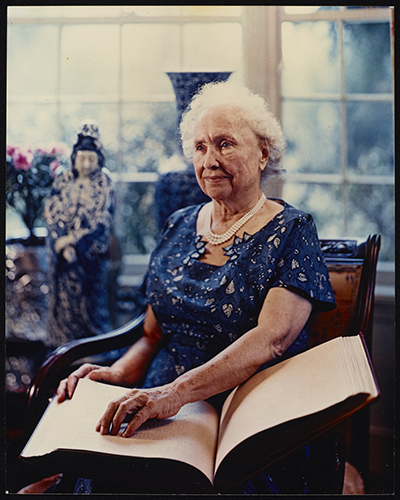Helen Keller seated and reading a book in braille, Westport, CT, 1960.
I have the honor of being an advisor for the Helen Keller Digital Archive, a project of the American Foundation for the Blind (AFB). One of the great aspects of a digital archive is that it makes the content more accessible to people with disabilities. AFB has gone even further to make the Helen Keller archive more usable by people with visual impairments or blindness. Helen Keller was one of the most famous social activists of the 20th century, and a notable campaigner in disability rights—I am thrilled that it will now be far easier for all people, including blind people, to dig in to the original documents and artifacts of this famous leader.
AFB’s efforts to make the archive more accessible is probably why I was asked to be an advisor. As the CEO of Benetech, I have a background in optical character recognition and digital accessibility. The archive uses optical character recognition to turn scans of typewritten documents (pictures of pages) into text versions. These text versions benefit everybody enabling an index of the full text of all of the typewritten documents in the archive, which makes it easier to find the right documents. And of course, the text of each scanned page can be accessed by blind people using synthetic speech or braille. Helen Keller was a huge fan of braille, since she was also deaf and relied on braille for so much of her communication.
In the 1950s, a deafblind person like Helen Keller had access to relatively few books in braille, and documents she received had to be hand-converted on a braille typewriter by her staff. With today’s technology advances and the ebook revolution, a blind person has access to hundreds of thousands of books in braille, and a person who is deafblind can independently surf the Helen Keller Archive with a digital braille display (think of it as an iPad for people who are blind), without depending on help from anybody else.
Exploring the archive is fascinating, and turns up controversial material still relevant today. One of the documents that surfaced quickly is the Freedom of Information Act request to the FBI for information about Helen Keller. With today’s surveillance debates, it’s interesting to find out that the FBI was tracking Keller because of her contacts with socialist activists. Not everything in the archive is as serious as the FBI spying on Helen Keller. I really enjoyed stumbling around the archive (and Helen Keller’s life) and finding a photo of a medal "Order of the Sacred Treasure, Third Class" presented to her by the Emperor of Japan. It’s an impressive medal: I wonder what the first and second degree versions look like!
Our work at Benetech centers on accessibility to information for as many people as possible. Benetech operates the largest digital library serving people with disabilities, Bookshare, with over 625,000 accessible ebook titles. One of the reasons we have so many books is that over 800 publishers voluntarily contribute their ebook titles to Bookshare, in industry-standard ebook formats that happen to be highly accessible. It’s this universal design aspect of digital text that makes it usable by such a range of people. That’s why we’re driving forward with our Born Accessible campaign to encourage publishers that any content they develop that is "born digital," is also "born accessible." We’re excited about a new archive, like the Helen Keller Digital Archive, launching as a Born Accessible archive!
Having access to the full text of Helen Keller’s correspondence makes it easy to search the entire archive for everyone’s benefit. I hope that more and more archives follow the lead of the Helen Keller Archive in making text versions of all documents available and accessible!
